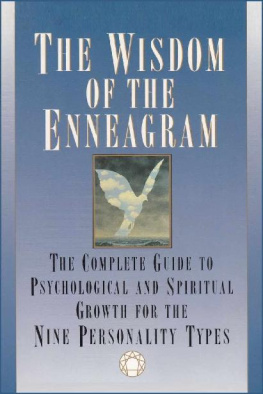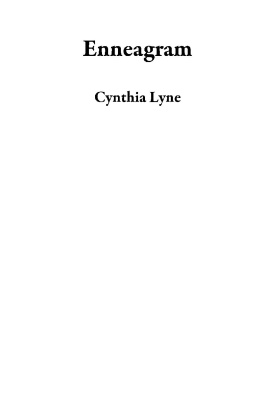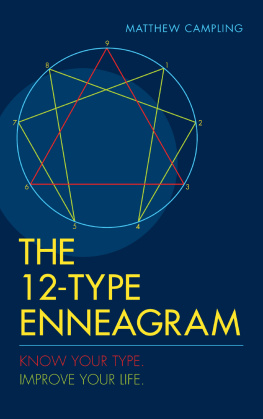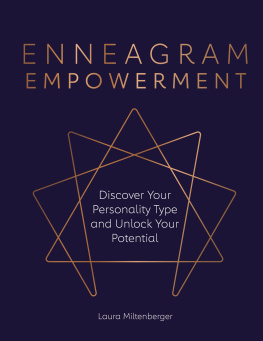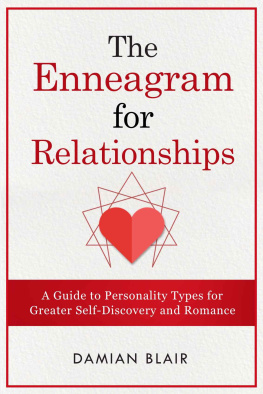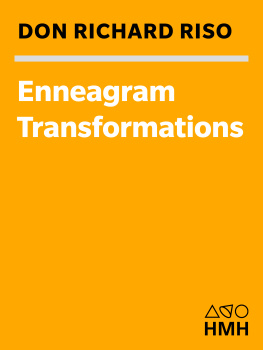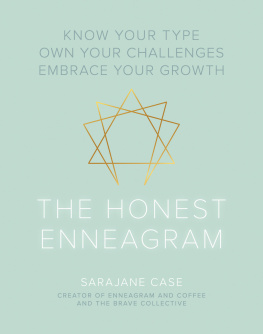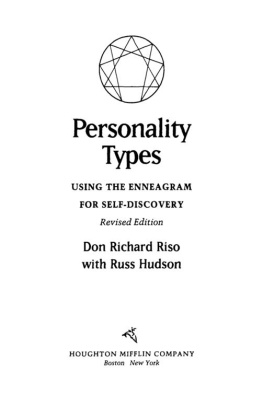Appendix: The Validation of the RHETI
In March, 2001, the Riso-Hudson Enneagram Type Indicator (RHETI, version 2.5) was officially validated by independent research, a doctoral dissertation written by Rebecca Newgent, Ph.D., at the University of Akron. Dr. Newgent's dissertation is entitled An Investigation of the Reliability and Validity of the Riso-Hudson Enneagram Type Indicator and is available from UMI Dissertation Services (at 800-521-0600). Dr. Newgent concluded that the RHETI is scientifically "valid and reliable" as a test instrument with "solid psychometrics." With these findings, the RHETI becomes the most widely used Enneagram-based questionnaire to be independently validated by an impartial researcher.
Internal-consistency reliability scores indicate that the RHETI ranges from 56 percent to 82 percent accurate on the various types, with an overall accuracy of 72 percent. These scores are the result of "blind testing." Neither the instructor nor the test takers had any Enneagram instruction, so these scores would be expected to be significantly higher after more exposure to the Enneagram. Nevertheless, this is quite respectable for a psychological test and compares favorably with other Enneagram-based tests. Additional research is planned to bring the RHETI more solidly into the 80 percent range overall, which would be an extraordinarily high rating for a psychological test based on self-reportage.
According to this research on the RHETI, the internal-consistency reliability alpha (Cronbach Coefficient Alpha) scores for the nine types of the Enneagram as measured by the RHETI are as follows:
Type One: 73 percent
Type Two: 82 percent
Type Three: 56 percent
Type Four: 70 percent
Type Five: 56 percent
Type Six: 66 percent
Type Seven: 80 percent
Type Eight: 75 percent
Type Nine: 79 percent
Dr. Newgent also compared the RHETI with the NEO PI-R test, which has become the psychometric standard for testing nonpathological personality. The NEO PI-R measures the factors of Neuroticism, Extraversion, Openness, Agreeableness, and Conscientiousness (the "Five Factor Model"). According to Dr. Newgent, "results of testing ... indicated strong correlations between the findings of the RHETI and the factors of the NEO-PI-R."
Dr. Newgent further found that "results of testing for concurrent validity between the RHETI types and the NEO PI-R factors indicate that the majority of the demographic descriptive variables are invariant to the RHETI. The RHETI was able to predict the NEO PI-R factors a majority of the time, with a few exceptions, regardless of the demographic variable."
Drafting and pretesting on the RHETI began in 1993. The authors hope that the RHETI, independently researched at this high level of validation, will give more credibility to the Enneagram in academic, educational, and business fields. (Qualified researchers are invited to contact The Enneagram Institute to undertake further research on the RHETI and/or other aspects of the authors' work with the Enneagram.) The results of Dr. Newgent's research also indirectly indicate the solid grounding of the Insight ApproachSM on which the RHETI is based. This test could not have been constructed without careful observation of individuals, precision in discriminating differences between the types, and the conceptual underpinning of the RHETI with the Levels of Development, as well as other factors that are part of the Insight Approach.
Resources
Books
Almaas, A. H. Diamond Heart (Vols. 11V). Boston and London: Shambala, 19871997.
. Essence. York Beach, Maine: Samuel Weiser, 1986.
. Spacecruiser Inquiry. Boston and London: Shambala, 2002.
Epstein, Mark. Thoughts Without a Thinker. New York: Basic, 1995.
Horney, Karen. Neurosis and Human Growth. New York: W. W. Norton, 1950.
. Our Inner Conflicts. New York: W. W. Norton, 1945.
Kornfield, Jack. A Path with Heart. New York: Bantam, 1993.
Mitchell, Stephen A., and Margaret J. Black. Freud and Beyond. New York: Basic, 1995.
Naranjo, Claudio. Character and Neurosis. Nevada City, Calif.: Gate-ways/lDHHB, 1994.
Nisargadatta, Maharaj. I Am That. Translated by Maurice Frydman. Durham, N.C.: Acorn, 1973, 1982.
Ouspensky, P. D. In Search of the Miraculous. New York: Harcourt, Brace & World, 1949.
. The Fourth Way. New York: Vintage, 1957, 1971.
Riso, Don Richard. Enneagram Transformations. Boston: Houghton Mifflin, 1993.
Riso, Don Richard, and Russ Hudson. Understanding the Enneagram. Boston: Houghton Mifflin, 1990, 2000.
Riso, Don Richard, and Russ Hudson. The Wisdom of the Enneagram. New York: Bantam, 1999.
Riso, Don Richard, with Russ Hudson. Personality Types. Boston: Houghton Mifflin, 1987, 1996.
Smith, Huston. Forgotten Truth. San Francisco: Harper San Francisco, 1985.
Speeth, Kathleen Riordan. The Gurdjieff Work. Berkeley, Calif.: And/Or Press, 1976.
Tolle, Eckhart. The Power of Now. Novato, Calif.: New World Library, 1999.
Walsh, Roger, and Frances Vaughn. Paths Beyond Ego. Los Angeles: Jeremy P. Tarcher/Perigee, 1993.
Wilber, Ken. The Eye of Spirit. Boston: Shambhala, 1997.
A Note on Enneagram Books
Numerous books on the Enneagram are currently available. Readers have become confused, however, by the inconsistencies and contradictions among them. Enneagram books about relationships, business, spiritualityor about any other topic, for that matterwill be of little use if they are based on an incomplete, anecdote-based notion of the types or of the Enneagram as a whole.
While all books on this field draw on Oscar Ichazo's seminal work in varying degrees, it is important to realize that there are many different teachings and approaches being referred to as "the Enneagram." For better or worse, there is no single authentic approach to the Enneagramand no official interpretation or teaching method that has come down through history in an "oral tradition" of any kind.
The Enneagram is a work in progress, and its continuing development relies on different authors making continuing discoveries and applications of it. Those interested in this system are therefore urged to read all Enneagram books (including our own) critically, to think for themselves, and always to judge everything by their own experience.
Web Sites
The Enneagram Institute (worldwide organization)
For more information about the Insight ApproachSM and for a reference to local Riso-Hudsontrained Enneagram teachers in your area, please contact
Don Richard Riso, President
Russ Hudson, Executive Director
3355 Main Street (Route 209)
Stone Ridge, NY 12484
Phone: (845) 687-9878
Fax: (845) 687-7486
E-mail: Info@EnneagramInstitute.com
Web site: www.EnneagramInstitute.com
Faculty of The Enneagram Institute
The name The Enneagram InstituteSM is service marked and may not be used by individuals or organizations not affiliated directly with The Enneagram Institute of New York.
The Enneagram Institute of New Mexico
Brian Grodner, Ph.D.
2741 Indian School Rd. NE
Albuquerque, NM 87106
Phone: (505) 255-6002
Fax: (505) 255-7890
E-mail: info@DrGrodnerRapidChange.com
Web site: www.DrGrodnerRapidChange.com
The Enneagram Institute of Central Ohio
Belinda Gore, Ph.D.
3105 Waukeegan Avenue
Lewis Center, OH 43035
Phone: (614) 227-9903
Fax: (614) 885-2453
E-mail: bgore@enneagram-ohio.com
Web site: www.enneagram-ohio.com
The Enneagram Institute of Tampa Bay
Jane W. Hollister, Director


